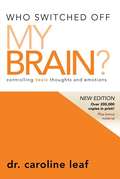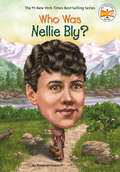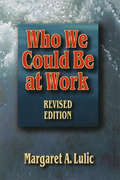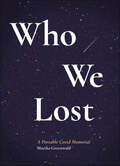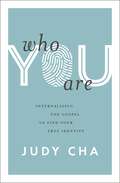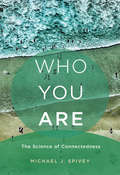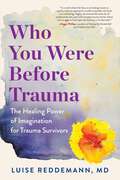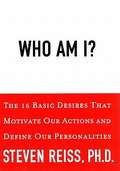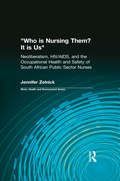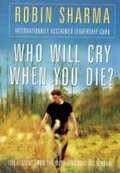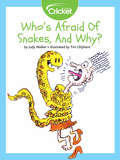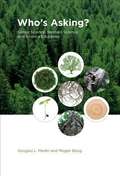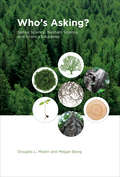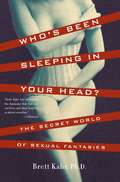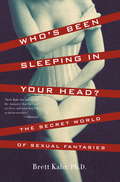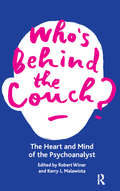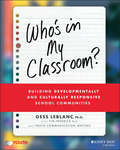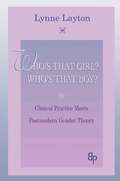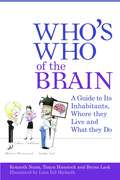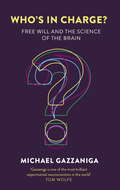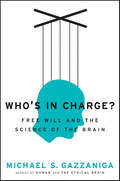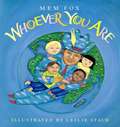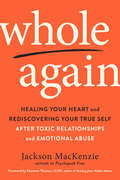- Table View
- List View
Who Switched Off My Brain? Controlling Toxic Thoughts and Emotions (Revised Edition)
by Caroline LeafDo you ever feel like your brain has just been "switched off"? Have you ever felt discouraged, unfocused or overwhelmed? Are there unhealthy patterns in your life or your family that you just can't seem to break? A thought may seem harmless, but if it becomes toxic, it can become physically, emotionally or spiritually dangerous. Thankfully, we are living in a time of revolution. We can see clearly how brain science lines up with Scripture--your mind can be renewed, toxic thoughts and emotions can be swept away and your brain really can be "switched on." In this book: * Learn how toxic thoughts are like poison and how to identify "The Dirty Dozen," twelve areas of toxic thinking in our lives. * Sweep away "The Dirty Dozen" by breaking the cycle of toxic thinking. Uncover how your thoughts can actually start to improve every area of your life--your relationships, your health and even your success.
Who Was Nellie Bly? (Who Was?)
by Margaret Gurevich Who HQGet ready to journey around the world with Nellie Bly--one of America's first investigative journalists. Elizabeth Cochrane Seaman had no idea that the open letter she'd written to a local newspaper in Pittsburgh in 1885 would change her life forever. The editor of the paper was so impressed with her writing, that he offered her a job! She'd later change her name to Nellie Bly and work as an investigative reporter in New York City. Known for her extraordinary and record-breaking trip around the world and her undercover investigation of a mental institution, Nellie Bly was one of the first female investigative reporters in the United States and a pioneer in the field of journalism.
Who We Could Be at Work
by Margaret LulicFirst published in 1996. This empowering business book addresses personal and organizational transformation. It provides practical insights and real models of change. Margaret Lulic creates a vision for change by showing how every individual, company and action are inter-connected.
Who We Lost: A Portable Covid Memorial
by Martha GreenwaldEssays mourning the losses of the COVID pandemic, and a guide to writing your own: &“A wonderful resource for those seeking an outlet for their grief.&” —Publishers Weekly In 2020, Martha Greenwald invited mourners to write memories of loved ones lost to COVID on the Who We Lost website. The site has been growing ever since, as the bereaved continue to write and publish stories, and the writers&’ toolbox section of the website offers guidance and prompts for anyone wishing to contribute their story to this grassroots public memorial. The resultant book, Who We Lost: A Portable COVID Memorial, contains dozens of essays and a writing guide for those wishing to add their own story about a loved one who died from COVID. It is a community-generated tribute, a eulogy, and a collective memorial—the first book that focuses on the grief of the COVID-bereaved, and offers a purposeful activity that respects mourners as well as the mourned. &“Who We Lost manages, in its specificity, to immortalize not only the people whose lives and losses are represented here but also so many others whose names have gone unlisted.&” —Third Coast Review
Who You Are: Internalizing the Gospel to Find Your True Identity
by Judy ChaIn our culture today, the preoccupation over self-identity--or who we are--is hard to ignore. But the pursuit of self-understanding has been a recurring theme throughout human history. How many times have you asked yourself, "Who am I?"The desire to answer this question--whether it manifests in self-enhancement strategies or self-serving biases--is part of being human. Yet, through a Biblical lens, we know something has gone terribly wrong with our human nature. Brokenness happened when sin separated us from our Creator God, and the answers we seek are only obtainable when we reconnect with him.Using the Gospel-Centered Integrative Framework for Therapy developed at Redeemer Counseling Services, Judy Cha explains:The human desire for an identityThe role of shame and hurt in shaping who we think we areSelf-redemption, and why it doesn't workThe Gospel as God's rescue plan for a lost humanityHow to ardently know your story, truly live in your community, and deeply connect with GodWho You Are shows us that the Gospel is the only thing that sets you free from the verdict of sin and justifies you as God's prized possession. When you internalize the Gospel--this message of restorative love--you come to know who you are more and more every day.This unique resource is ideal for those who feel stuck in a perpetual loop of "finding themselves" and for counselors or ministry leaders seeking to help others with gospel-centered healing.
Who You Are: The Science of Connectedness (The\mit Press Ser.)
by Michael J. SpiveyWhy you are more than just a brain, more than just a brain-and-body, and more than all your assumptions about who you are.Who are you? Are you just a brain? A brain and a body? All the things you have done and the friends you have made? Many of us assume that who we really are is something deep inside us, an inner sanctuary that contains our true selves. In Who You Are, Michael Spivey argues that the opposite is true: that you are more than a brain, more than a brain-and-body, and more than all your assumptions about who you are. Rather than peeling layers away to reveal the inner you, Spivey traces who you are outward. You may already feel in your heart that something outside your body is actually part of you—a child, a place, a favorite book. Spivey confirms this intuition with scientific findings.With each chapter, Spivey incrementally expands a common definition of the self. After (gently) helping you to discard your assumptions about who you are, he draws on research in cognitive science and neuroscience to explain the back-and-forth among all the regions of the brain and the interaction between the brain and body. He then makes the case for understanding objects and locations in your environment as additional parts of who we are. Going even further, he shows that, just as interaction links brain, body, and environment, ever-expanding systems of interaction link humans to other humans, to nonhuman animals, and to nonliving matter. This may seem an interaction or two too far. But you don't have to take his word for it—just consider the evidence he presents.
Who You Were Before Trauma: The Healing Power Of Imagination For Trauma Survivors
by Luise ReddemannIntroducing a proven, pioneering program that empowers trauma survivors to take control of their recovery through imaginative exercises Over the last thirty-five years, our understanding of trauma has dramatically changed. We now know that most people live through at least one traumatic event—which can cause disorders that range from depression, addiction, and anxiety, to cardiovascular disease and diabetes. But when leading German psychotherapist Luise Reddemann became head of a psychosomatic clinic in 1985, many doctors were routinely dismissive of patients’ trauma. Dr. Reddemann has devoted her career to this question: How can survivors of complex trauma and PTSD heal—and even help themselves to heal? In Who You Were Before Trauma, she presents her groundbreaking method, along with positive therapeutic strategies, to therapists and patients alike. Psychodynamic Imaginative Trauma Therapy (PITT) incorporates imagination work at every stage of the three-phase trauma therapy model: Establish safety and stabilization Come to terms with traumatic memories Integrate and reconnect with others. By guiding patients to unearth their buried strengths, envision an inner refuge, evoke helpful guiding figures, and ultimately build an “internal counterweight” to their trauma, Reddemann’s approach avoids the counterproductive dynamic where the therapist becomes the patient’s only source of comfort. This definitive trauma resource shows the way to empower survivors—by making them true partners in their recovery.
Who am I?
by Steven ReissWhat do we want? What makes us tick? From acceptance to vengeance to curiosity, this book explains the 16 basic and universal desires that shape our behavior-and shows how the ways we prioritize them determines our personalities. Grounded in up-to-date psychological research, this book can helpparents comprehend their children's needs and behaviorcouples understand each other betteremployers motivate their employees employees become more effective in their workYOU achieve greater satisfaction and happiness in life
Who am I?: 16 Basic Desires that Motivate Our Actions Define Our Persona
by Steven ReissWhat do we want? What makes us tick? From acceptance to vengeance to curiosity, this book explains the 16 basic and universal desires that shape our behavior--and shows how the ways we prioritize them determines our personalities. Grounded in up-to-date psychological research, this book can help parents comprehend their children's needs and behavior couples understand each other better employers motivate their employees employees become more effective in their work YOU achieve greater satisfaction and happiness in life
Who is Nursing Them? It is Us: Neoliberalism, HIV/AIDS, and the Occupational Health and Safety of South African Public Sector Nurses (Work, Health and Environment Series)
by Robert Forrant Charles Levenstein John Wooding Jennifer R. ZelnickThis book explores the impacts of HIV/AIDS and neoliberal globalization on the occupational health of public sector hospital nurses in KwaZulu-Natal, South Africa. The story of South African public sector nurses provides multiple perspectives on the HIV/AIDS epidemic-for a workforce that played a role in the struggle against apartheid, women who deal with the burden of HIV/AIDS care at work and in the community, and a constituency of the new South African democracy that is working on the frontlines of the HIV/AIDS epidemic. Through case studies of three provincial hospitals in KwaZulu-Natal, set against a historical backdrop, this book tells the story of the HIV/AIDS epidemic in the post-apartheid period.
Who will cry when you die
by Robin SharmaThe book intends to help you discover a wealth of wisdom that will enrich the quality of your professional, personal and spiritual life.
Who's Afraid of Snakes, and Why?
by Judy WalkerAre we born afraid of snakes, or is it something we learn from other people?
Who's Asking?
by Douglas L. Medin Megan BangThe answers to scientific questions depend on who's asking, because the questions asked and the answers sought reflect the cultural values and orientations of the questioner. These values and orientations are most often those of Western science. In Who's Asking?, Douglas Medin and Megan Bang argue that despite the widely held view that science is objective, value-neutral, and acultural, scientists do not shed their cultures at the laboratory or classroom door; their practices reflect their values, belief systems, and worldviews. Medin and Bang argue further that scientist diversity -- the participation of researchers and educators with different cultural orientations -- provides new perspectives and leads to more effective science and better science education. Medin and Bang compare Native American and European American orientations toward the natural world and apply these findings to science education. The European American model, they find, sees humans as separated from nature; the Native American model sees humans as part of a natural ecosystem. Medin and Bang then report on the development of ecologically oriented and community-based science education programs on the Menominee reservation in Wisconsin and at the American Indian Center of Chicago. Medin and Bang's novel argument for scientist diversity also has important implications for questions of minority underrepresentation in science.
Who's Asking?: Native Science, Western Science, and Science Education (The\mit Press Ser.)
by Douglas L. Medin Megan BangAnalysis and case studies show that including different orientations toward the natural world makes for more effective scientific practice and science education.The answers to scientific questions depend on who's asking, because the questions asked and the answers sought reflect the cultural values and orientations of the questioner. These values and orientations are most often those of Western science. In Who's Asking?, Douglas Medin and Megan Bang argue that despite the widely held view that science is objective, value-neutral, and acultural, scientists do not shed their cultures at the laboratory or classroom door; their practices reflect their values, belief systems, and worldviews. Medin and Bang argue further that scientist diversity—the participation of researchers and educators with different cultural orientations—provides new perspectives and leads to more effective science and better science education.Medin and Bang compare Native American and European American orientations toward the natural world and apply these findings to science education. The European American model, they find, sees humans as separated from nature; the Native American model sees humans as part of a natural ecosystem. Medin and Bang then report on the development of ecologically oriented and community-based science education programs on the Menominee reservation in Wisconsin and at the American Indian Center of Chicago. Medin and Bang's novel argument for scientist diversity also has important implications for questions of minority underrepresentation in science.
Who's Been Sleeping In Your Head
by KahrIn the largest study ever undertaken on sexual fantasy, world-renowned psychotherapist and researcher Brett Kahr reveals the astonishing truths behind secrecy, shame, and taboo in this groundbreaking book based on surveys of 23,000 men and women from eighteen to ninety years of age. The definitive account of what our fantasies tell us about ourselves, Who’s Been Sleeping in Your Head? overturns conventional wisdom about sexuality today.
Who's Been Sleeping In Your Head
by KahrWorld-renowned psychotherapist and researcher reveals the astonishing truths behind secrecy, shame, and taboo
Who's Been Sleeping In Your Head: The Secret World of Sexual Fantasies
by Brett KahrIn the largest study ever undertaken on sexual fantasy, world-renowned psychotherapist and researcher Brett Kahr reveals the astonishing truths behind secrecy, shame, and taboo in this groundbreaking book based on surveys of 23,000 men and women from eighteen to ninety years of age. The definitive account of what our fantasies tell us about ourselves, Who’s Been Sleeping in Your Head? overturns conventional wisdom about sexuality today.
Who's Behind the Couch?: The Heart and Mind of the Psychoanalyst
by Kerry L. Malawista Robert WinerWhat is it like to be a working psychoanalyst? And what is it like to be held in the mind of one? These were the questions that led Winer and Malawista to interview seventeen notable analysts from around the world. Who's Behind the Couch?: The Heart and the Mind of the Psychoanalyst explores the analyst's mind at work, not so much from a theoretical perspective, but rather from the complexities and richness inherent in every moment-to-moment clinical encounter. As analysts we are all continually challenged to find what might work best with a particular patient. Yet we don't often hear senior analysts share their personal struggles, feelings, and sensibilities. To understand the internal experience of analysts the authors posed questions such as: What is it like for analysts to manage rough spots, to lose ground and try to recapture it? To feel appreciated and then to feel devalued? To feel betrayed? To feel responsibility for someone's life while working to maintain their own balance?
Who's In My Classroom?: Building Developmentally and Culturally Responsive School Communities
by Gess LeBlanc Tim FredrickCapitalize on the latest educational research and youth voices to inform your teaching and become more culturally and developmentally aware In Who's In My Classroom?, accomplished educator and author delivers an inspirational and practical combination of true stories from teens in Youth Communication's award-winning writing program and the most current educational research. The book links theories of adolescent development and identity formation to best practices in real-world classrooms where teachers strive to form supportive relationships with students. In this book, you'll find: Narrative and explanations of the most cutting-edge research in educational and developmental psychology and cultural competence Excerpts from stories by students specifically written and edited with social and emotional learning competencies in mind Practical and concrete strategies for administrators and teachers to implement for sustainable improvement in learning outcomes for their students, including the use of Youth Communication’s stories Perfect for K-12 educators, counselors, and administrators, Who's In My Classroom? is also an indispensable resource for higher education professionals and pre-service teachers seeking a practical guide to help them become more developmentally and culturally responsive in their work.
Who's That Girl? Who's That Boy?: Clinical Practice Meets Postmodern Gender Theory
by Lynne LaytonHailed on publication as "an impressive integration of postmodernism and relational psychoanalysis" (James Hansel) and "an intelligent and stimulating account of where the issues of identity, gender, and difference are joined" (Jessica Benjamin), Lynne Layton's Who's That Girl? Who's That Boy? is a major contribution to the postmodern understanding of gender issues. This new edition, under the aegis of the Bending Psychoanalysis Book Series, includes a Foreword by Series Editor Jack Drescher and an Afterword in which Lynne Layton addresses the evolution of her thinking since the book's publication in 1998.
Who's Who of the Brain: A Guide to Its Inhabitants, Where They Live and What They Do
by Bryan Lask Tanya Hanstock Ken NunnMeet the inhabitants of the brain in this reader-friendly introduction to what it is and how it works. Residents include Frederick Foresight (the frontal cortex), Mayor of Cephalton-upon-Ridge, who is the `big picture' person responsible for planning and decision-making; Sage Seahorse (the hippocampus), who has an astonishing memory for times, names and places; Annie Almond (the amygdala), the community's alarm system who is always on the alert; and many other fellow citizens. Each character is introduced and their appearance, role and key functions in the brain explained. The authors also show what happens when things go wrong in the brain, and illustrate the work using examples of classic clinical cases. This book provides an immediate and entertaining way for anyone to gain a basic understanding or to refresh their knowledge of the inside workings of the brain.
Who's in Charge?: Free Will and the Science of the Brain
by Michael GazzanigaThe prevailing orthodoxy in brain science is that since physical laws govern our physical brains, physical laws therefore govern our behaviour and even our conscious selves. Free will is meaningless, goes the mantra; we live in a 'determined' world.Not so, argues the renowned neuroscientist Michael S. Gazzaniga as he explains how the mind, 'constrains' the brain just as cars are constrained by the traffic they create. Writing with what Steven Pinker has called 'his trademark wit and lack of pretension,' Gazzaniga ranges across neuroscience, psychology and ethics to show how incorrect it is to blame our brains for our behaviour. Even given the latest insights into the physical mechanisms of the mind, he explains, we are responsible agents who should be held accountable for our actions, because responsibility is found in how people interact, not in brains.An extraordinary book, combining a light touch with profound implications, Who's in Charge? is a lasting contribution from one of the leading thinkers of our time.
Who's in Charge?: Free Will and the Science of the Brain
by Michael S. Gazzaniga“Big questions are Gazzaniga’s stock in trade.”—New York Times“Gazzaniga is one of the most brilliant experimental neuroscientists in the world.”—Tom Wolfe“Gazzaniga stands as a giant among neuroscientists, for both the quality of his research and his ability to communicate it to a general public with infectious enthusiasm.”—Robert Bazell, Chief Science Correspondent, NBC News The author of Human, Michael S. Gazzaniga has been called the “father of cognitive neuroscience.” In his remarkable book, Who’s in Charge?, he makes a powerful and provocative argument that counters the common wisdom that our lives are wholly determined by physical processes we cannot control. His well-reasoned case against the idea that we live in a “determined” world is fascinating and liberating, solidifying his place among the likes of Oliver Sacks, Antonio Damasio, V.S. Ramachandran, and other bestselling science authors exploring the mysteries of the human brain.
Whoever You Are
by Mem FoxEvery day all over the world, children are laughing and crying, playing and learning, eating and sleeping. They may not look the same. They may not speak the same language. Their lives may be quite different. But inside, they are all alike. Stirring words and bold paintings weave their way around our earth, across cultures and generations. At a time when, unfortunately, the lessons of tolerance still need to be learned, Whoever You Are urges us to accept our differences, to recognize our similarities, and--most importantly--to rejoice in both.
Whole Again: Healing Your Heart and Rediscovering Your True Self After Toxic Relationships and Emotional Abuse
by Jackson MacKenzie Shannon ThomasFrom a leading voice on recovering from toxic relationships, a deeply insightful guide to getting back to your "old self" again--in order to truly heal and move on.Jackson MacKenzie has helped millions of people in their struggle to understand the experience of toxic relationships. His first book, Psychopath Free, explained how to identify and survive the immediate situation. In this highly anticipated new book, he guides readers on what to do next--how to fully heal from abuse in order to find love and acceptance for the self and others.Through his close work with--and deep connection to--thousands of survivors of abusive relationships Jackson discovered that most survivors have symptoms of trauma long after the relationship is over. These range from feelings of numbness and emptiness to depression, perfectionism, substance abuse, and many more. But he’s also found that it is possible to work through these symptoms and find love on the other side, and this book shows how. Through a practice of mindfulness, introspection, and exercises using specific tools, readers learn to identify the protective self they've developed - and uncover the core self, so that they can finally move on to live a full and authentic life--to once again feel light, free, and whole, and ready to love again. This book addresses and provides crucial guidance on topics and conditions like: complex PTSD, Narcissistic abuse, Avoidant Personality Disorder, Codependency, Core wounding, toxic shame, Borderline Personality Disorder, and so many more. Whole Again offers hope and multiple strategies to anyone who has survived a toxic relationship, as well as anyone suffering the effects of a breakup involving lying, cheating and other forms of abuse--to release old wounds and safely let the love back inside where it belongs.
